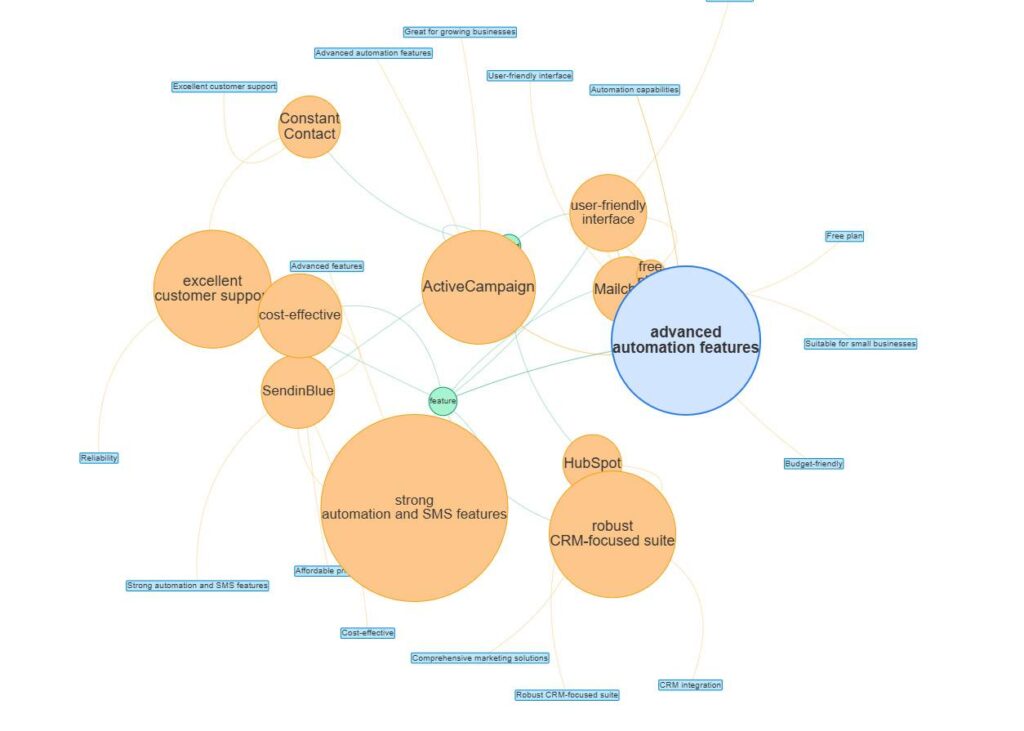The Evolution from SEO to GEO
In January 2023, Microsoft announced that Bing would use OpenAI (aka ChatGPT) to create its results, giving rise to Search Generative Experience (SGE), now known as AI Overviews.
Google’s alternative came a year later, launching AI Overviews experimentally during 2024 and then only across specific markets. By the end of last year, Google expanded the use of AI Overviews to over 100 countries.
Like their Bing counterparts, AI Overviews appear at the top of the search results page, pushing the traditional results down the page, often below the fold.
In late 2024, SEO Surfer published statistics collected by researching over 400,000 Google Searches. They discovered that only 52% of sources mentioned in the AI Overview rank in the top 10 results.
While statistics show that Google commands over 93% of the search engine market, the use of Chat in generative AI search and overviews may add a new dynamic influencing the consumer’s perception how authoritative and trustworthy a piece of information is.
The Decision Lab published an article on Authority Bias. They posts:
authority bias describes our tendency to be more influenced by the opinions and judgments of authority figures. This bias can lead people to accept information or follow instructions without critically evaluating the content, simply because it comes from a perceived authority
Unlike summary snippets presented by search engines drove changes to how content is optimized, it didn’t change who people psychologically associate authority to a topic.
Back in 2019, Ipsos published data identifying the a person’s perceived trustworthiness was matched to their vocation. Teachers and ordinary people were two of the most trustworthy in a list of 18 types, beaten only by scientists and doctors.
Similarly, emerging research is suggesting that consumers of generative AI search associate the trustworthiness of the response in the same way they trust a teacher more than an advertising executive, for example.
This is starting to feel like an inflexion point in how companies and brands will need to optimize for customer search, perhaps triggered by a difference in how Search Engines and generative AI models work, and how people perceive the authoritative and trustworthiness of the response.
On its own, a brand might undervalue the impact of AI Overviews when other factors, such as:
- Where people spend time online?
- How they value the quality of information from generative AI versus Search Results?
- What is the consumer clicking on?
If we expand our analysis to include the growth in voice search then the case for GEO grows stronger. Keywords Everywhere reported that by the end of 2024, over 55% of people had used voice search to ask questions. That’s people speaking into their cellphone and listening to the response. Not looking at a paid advertisement or what other links might be ranking above or below the fold..
The potential for AI Overviews to impact a brand’s visibility to the customer could be huge. Traditional SEO alone may not be enough.
What is Generative Engine Optimization (GEO)?
SEO has been and is about increasing visibility online. It optimizes websites to rank as high as possible on the search engine results page (SERP).
However, as Google, Bing, Perplexity, and other platforms that offer AI-powered search tools grow in popularity, the way people search for information will change.
Traditionally, SERPs present a list of links ranked with the best match at the top. In contrast, AI search presents a conversational response driven by an AI engine that understands natural language. The AI doesn’t understand search, it relies on calculus to identify given an input, what the likely next word in the sequence should be.
Where SEO was all about optimizing content for a search algorithm, a brand now needs to create content that is understood, referenced, and cited by the AI search engine.
It is worth noting that AI doesn’t understand text or language (it gives the appearance that it does, but really it doesn’t). AI is built on mathematics, and any qualitative data must first be converted into numbers, before the AI can use it. Content that achieves a desired outcome for search and the consumer, may fall short with AI.
This is where GEO comes in. It’s about ensuring that a site’s content is presented in the AI response.
The Problem GEO Solves: The Decline of Traditional Search Clicks
In March 2024, Sparktoro, the audience research company, reported that people spend just 10.25% of their online time using Search Engines. The rest of the time, 73% of Americans, for example spend the largest proportion of their time on social media.
Generative AI search and AI Overviews isn’t limited to search results. The underlying AI models were trained on a vast amount of public information, including what is available in forums like Reddit.
How Do SEO and GEO Compare?
- How Search Works
SEO: Users type queries into Google/Bing, see a ranked list of links, and click a result.
GEO: Users ask AI-powered search engines (e.g., ChatGPT, Google AI Overview, Perplexity) and receive a direct AI-generated answer.
- Content Delivery
SEO: Google ranks websites based on backlinks, keywords, and user behavior.
GEO: AI models generate responses by summarizing multiple sources and retrieving relevant facts.
- User Experience
SEO: Users browse multiple links for information.
GEO: Users expect instant answers without clicking through to websites.
- Optimization Focus
SEO: Keywords, metadata, backlinks, and site authority.
GEO: Conversational relevance, structured data, factual accuracy, and AI-friendly formatting.
- Traffic Flow
SEO: Search results drive website visits.
GEO: AI generated responses may bypass websites, reducing direct clicks.
- Example Search Query
SEO: “Best CRM software for startups” – search engine shows a list of websites.
GEO: “What’s the best CRM software?” – AI chatbots summarize recommendations without direct website clicks.
Why GEO is Critical for Businesses?
It all comes down to the differences between traditional search engines and how generative AI models work. Generative AI models are deterministic. Given the same input, their output will always be the same. The apparent randomness seen when using the likes of ChatGPT is born from how the technology that surrounds it.
As AI Overviews grow in popularity, businesses, marketers, and content creators must re-evaluate their content strategies. In addition to traditional SEO techniques to rank for keywords in SERPs, practitioners will need to:
- Identify how AI models evaluate and recognize relevant content.
- Ensure that their content is authoritative and trustworthy.
- Create and structure content that the AI can easily understand.
What Industries are Most Impacted by GEO?
- E-commerce and Retail. E.g. product recommendations.
- Saas and Technology. E.g. Software and solution recommendations.
- News and MediaSummarizing information resulting in less traffic.
- Healthcare and FinanceGenerating advice, which the AI itself does not know if it is sharing correctly.
Key Strategies to Implement GEO for Your Business
Just as with SEO, understanding how each generative AI model works and makes decisions will be key. This includes understanding what information sources it uses and what content it sees as more authoritative and trustworthy.
In some cases this will include combing the analysis of Google or Bing search results with the AI’s ability to provide an answer.
SEO has always been about optimizing a single site (topic authority, back links, etc.). However, generative AI relies on a multitude of sources to author its response. Ensuring that your brand is seen as both authoritative and trustworthy across multiple authoritative and trustworthy sources will be a vital component of your future SEO/GEO strategy.
Supporting this strategy will be the monitoring of how generative AI understands and presents your brand and it will need to become a core part of your everyday SEO routine.
Take the figure below. We took the response from ChatGPT asking:
“What marketing automation tool do you recommend for a small business”
The size of each bubble represents the authoritative, trustworthiness, and positive sentiment against each keyword/sentence drawn from the response, and how they relate to brand, product, and feature.

Conclusion: The Future of Search is Generative – Are You Ready?
Is this the end of SEO? No, however, how we approach SEO is changing.
Any business that relies on search traffic for leads and business now needs to weave GEO into their marketing strategies.
We are at the beginning of GEO, and so there is time to adapt. However, technology, the use of voice, the perceived trustworthiness of AI chat responses, and the growing reliance on generative AI mean that now is the time to get started.



